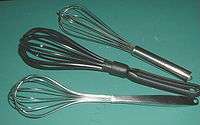whisk
English

Kitchen whisks (sense 2)
Pronunciation
- IPA(key): /(h)wɪsk/
- Rhymes: -ɪsk
Etymology 1
Middle English [Term?], from Old Norse visk[1][2], from Proto-Germanic *wiskaz, *wiskō (“bundle of hay, wisp”), from Proto-Indo-European *weys-.
Cognate with Danish visk, Dutch wis, German Wisch, Latin virga (“rod, switch”), viscus (“entrails”), Lithuanian vizgéti (“to tremble”), Czech vechet (“wisp of straw”), Sanskrit वेष्क (veṣka, “noose”). Compare also Old English wiscian (“to plait”), granwisc (“awn”).
Noun
whisk (plural whisks)
- A quick, light sweeping motion.
- With a quick whisk, she swept the cat from the pantry with her broom.
- A kitchen utensil, made from stiff wire loops fixed to a handle, used for whipping (or a mechanical device with the same function).
- He used a whisk to whip up a light and airy souffle.
- A bunch of twigs or hair etc, used as a brush.
- Peter dipped the whisk in lather and applied it to his face, so he could start shaving.
- A small handheld broom with a small (or no) handle.
- I used a whisk to sweep the counter, then a push-broom for the floor.
- A plane used by coopers for evening chines.
- A kind of cape, forming part of a woman's dress.
- Samuel Pepys
- My wife in her new lace whisk.
- Samuel Pepys
- (archaic) An impertinent fellow.
- (Can we find and add a quotation of Halliwell to this entry?)
Translations
quick, light sweeping motion
kitchen utensil
|
|
bunch of twigs or hair etc, used as a brush
Verb
whisk (third-person singular simple present whisks, present participle whisking, simple past and past participle whisked)
- (transitive) To move something with quick light sweeping motions.
- J. Fletcher
- He that walks in gray, whisking his riding rod.
- Vernon whisked the sawdust from his workbench.
- J. Fletcher
- (transitive) In cooking, to whip e.g. eggs or cream.
- The chef prepared to whisk the egg whites for the angel's food cake.
- (transitive) To move something rapidly and with no warning.
- Walpole
- I beg she would not impale worms, nor whisk carp out of one element into another.
- The governess whisked the children from the room before they could see their presents.
- Walpole
- (intransitive) To move lightly and nimbly.
- 1898, Winston Churchill, chapter 1, in The Celebrity:
- The stories did not seem to me to touch life. […] They left me with the impression of a well-delivered stereopticon lecture, with characters about as life-like as the shadows on the screen, and whisking on and off, at the mercy of the operator.
- The children whisked down the road to the fair, laughing and chattering as they went.
-
Translations
to move something with quick light sweeping motions
in cooking, to whip e.g. eggs or cream
to move something rapidly and with no warning
to move lightly and nimbly
|
References
- According to ODS eng. (vist laant fra nord.) whisk, the English (certainly borrowed from Old Norse) whisk
- Etymology in Webster's Unabridged Dictionary
Etymology 2
So called from the rapid action of sweeping the cards off the table after a trick has been won.
Noun
whisk (uncountable)
- (obsolete) The card game whist.
- (Can we find and add a quotation of Taylor (1630) to this entry?)
This article is issued from
Wiktionary.
The text is licensed under Creative
Commons - Attribution - Sharealike.
Additional terms may apply for the media files.